Review by Tim Robins
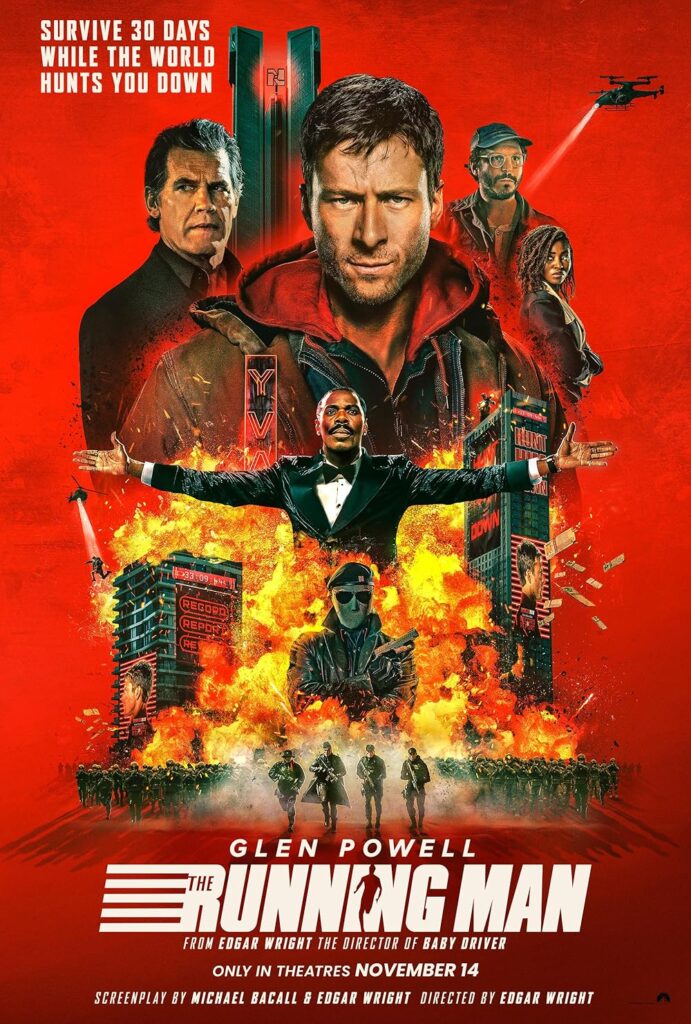
The Film: In a near-future society, The Running Man is the top-rated show on television – a deadly competition where contestants, known as Runners, must survive 30 days while being hunted by professional assassins, with every move broadcast to a bloodthirsty public and each day bringing a greater cash reward. Desperate to save his sick daughter, working-class Ben Richards (Glen Powell) is convinced by the show’s charming but ruthless producer, Dan Killian (Josh Brolin), to enter the game as a last resort.
But Ben’s defiance, instincts, and grit turn him into an unexpected fan favourite – and a threat to the entire system. As ratings skyrocket, so does the danger, and Ben must outwit not just the Hunters, but a nation addicted to watching him fall…
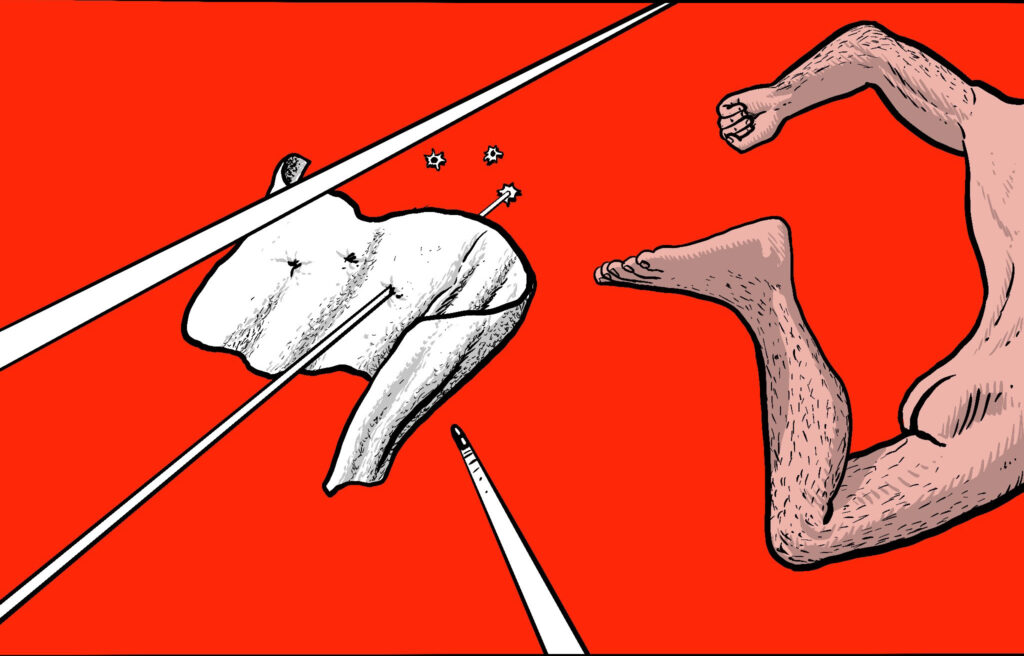
The Review: I felt no great need to rush and see The Running Man, but, if you do decide to pop into your local cinema, the film is, at the very least, an entertaining way to keep warm for a few hours – adverts included – on a winter’s day.
The Running Man is the second time Stephen King’s book of the same name has been adapted for cinema. I still have fond memories of the Eighties’ action romp starring Arnold Schwarzenegger and haven’t read the original story, but the new movie can be enjoyed in its own right.
That said, the plot feels terribly familiar from the dystopian futures of Rollerball and Robocop, and I also felt that I’d seen the setting in many, many stories from pages of 2000AD. I guess the whole trope of people hunted for entertainment has The Most Dangerous Game as a prototype, of which the Hunger Games is a variant, albeit crossed with Battle Royale.
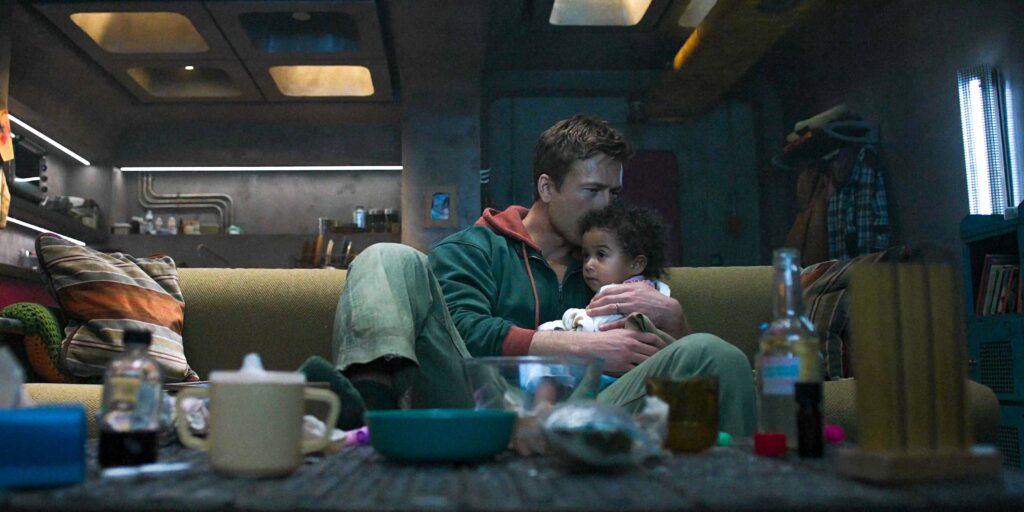
This time out, it is down and out of work family man, Ben Richards (Glen Powell), who tries to lift his family out of poverty by reluctantly volunteering as a contestant in a TV network’s humiliating and violent game shows. Unfortunately, Richard’s angry, anti-authoritarian, altruistic tendencies mark him out as an ideal candidate for the most deadly show of all – The Running Man.
The rules of The Running Man boil down to contestants managing to live 30 days while being hunted down by the general public and a group of “hunters”, all the while having their characters assassinated by contrived, AI generated biopics and the negative spin of the game’s suitably slimy host, “Bobby T” (Michael Cera). All the while, events are manipulated by the shows’ producer, Dan Killian, played just the right side of camp and with rictus grin enthusiasm by Josh Brolin.
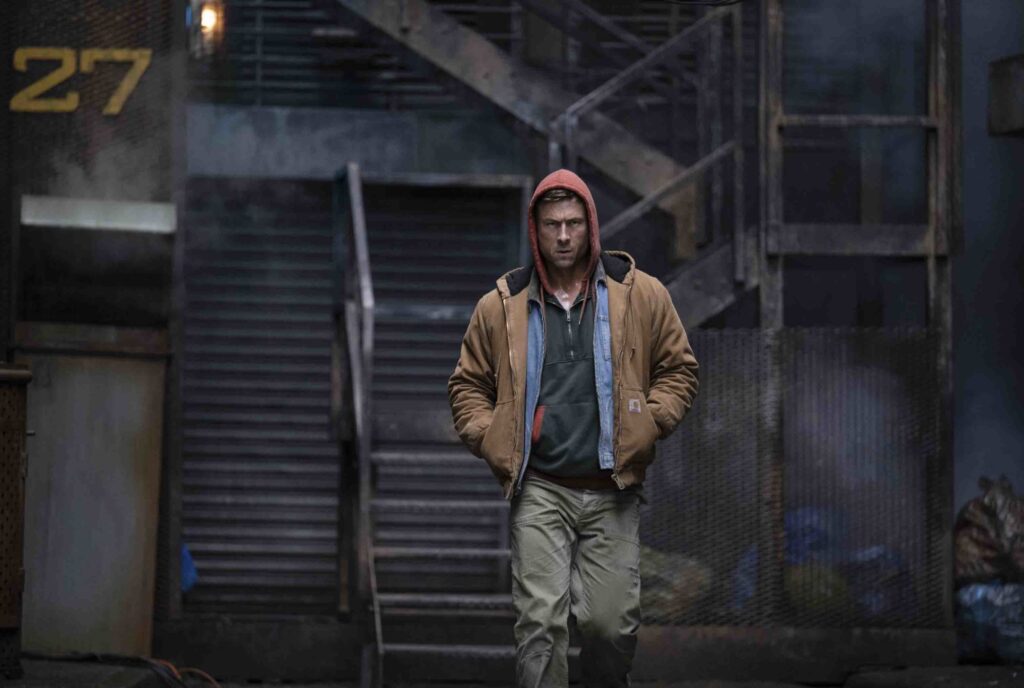
The film is directed by Edgar Wright, who has gained a cultish fan following from the TV sitcoms Asylum and Spaced and the so-called ‘The Flavours Cornetto Trilogy’ of films comprising Shaun of the Dead, Hot Fuzz and The World’s End. These saw Wright feted as an ‘auteur’, particularly among American audiences for whom British humour remains a strange and wonderful thing instead of as expected (but still not run of the mill).
The Running Man isn’t even a dark comedy but it has moments of humour – it was fun seeing Arnold Schwarzenegger’s face printed on 100 dollar bills, the Governor of California having become president of America in this future. But for the most part, nothing really sticks as Wright’s restless camera moves on and on and on.
Individual moments work well enough, but sometimes Wright seems to lack the patience to see them through. This is exemplified by a car chase experienced by Richards who is stuck in the boot of the car while being pursued, so can only hear the voices of his rescuers and feel the jarring twists and turns in the road. But it isn’t long before we cut to exterior wide shots and character close ups to spell out the not terribly surprising stakes in the scene.
Indeed, the film is all over the place. Richards runs from a luxury hotel to a doss house to an apartment to the countryside and a home in Derry, Stephen King’s oft used setting. But I’m not convinced the film wouldn’t have been better sticking to the city, given that action movies such as The Raid and Dredd have used a single building as effective settings. Hotel-based-escapades showing off Glen Powell’s buff body, clad only in a tiny towel, are entertaining eye candy, but the humour of the situation could have been given more room(s) to develop.
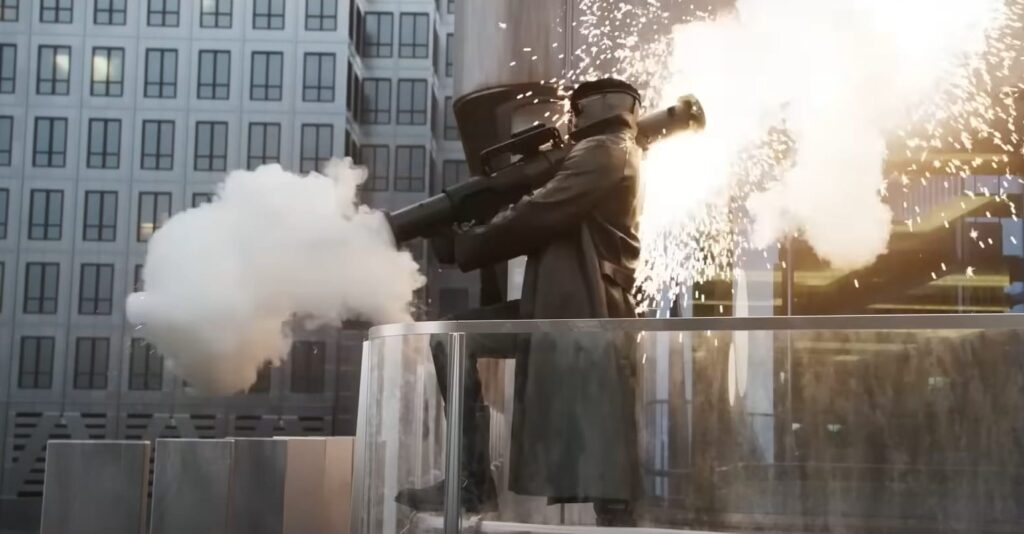
The world of The Running Man isn’t particularly well developed, either. The city is a grimmer take on Blade Runner’s aestheticised squalor, but Richard’s hopeless situation is ladled on so thick that I began to wonder whether the fact that the character is in a ‘mixed-race’ marriage was supposed to be a sign of his degradation. It isn’t, as Richard’s entire class is labelled as “your kind” (yuck).
The film does have plenty to play with. I enjoyed a guest appearance by William H Macy as Molie, who supplies Richards with a variety of weapons and false identities. Molie is clearly the film’s “Q”. But why? Apart from being a useful plot contrivance, his scene seems to foreshadow a fight on a plane in which Richards comes across as Bond, and the whole scenario goes a bit Goldfinger.
Perhaps the real problem is that The Running Man has at its heart an entirely inauthentic politics. One man with no power can’t bring the political change the film implies it will, no matter how many people he inspires. And given the fact Richards’ words and image are easily manipulated, why and how would anyone see through the facade. And Richards’ personal motivation – family and revenge – can only go so far, particularly when we realise there may be nothing real to avenge.
Wright aspires to trite Hollywood tropes and I wish he hadn’t bothered. By the time his film works through them, they’d out stayed their welcome, or just been forgotten. So when, with a flourish, a pair of baby socks are pulled out of the film’s shopping basket of themes, it took real effort to remember that they were first introduced to signify the film’s heart.
But where The Running Man trips and falls is that there’s nothing in the film that is quite as grim as what we can see on the actual news. It seems we’ve reached a time where reality has outpaced science fiction’s dystopian imagination.
Tim Robins
The Running Man is in cinemas now
Dear reader, a review is an opinion. Other opinions are available, including yours
Head downthetubes for…
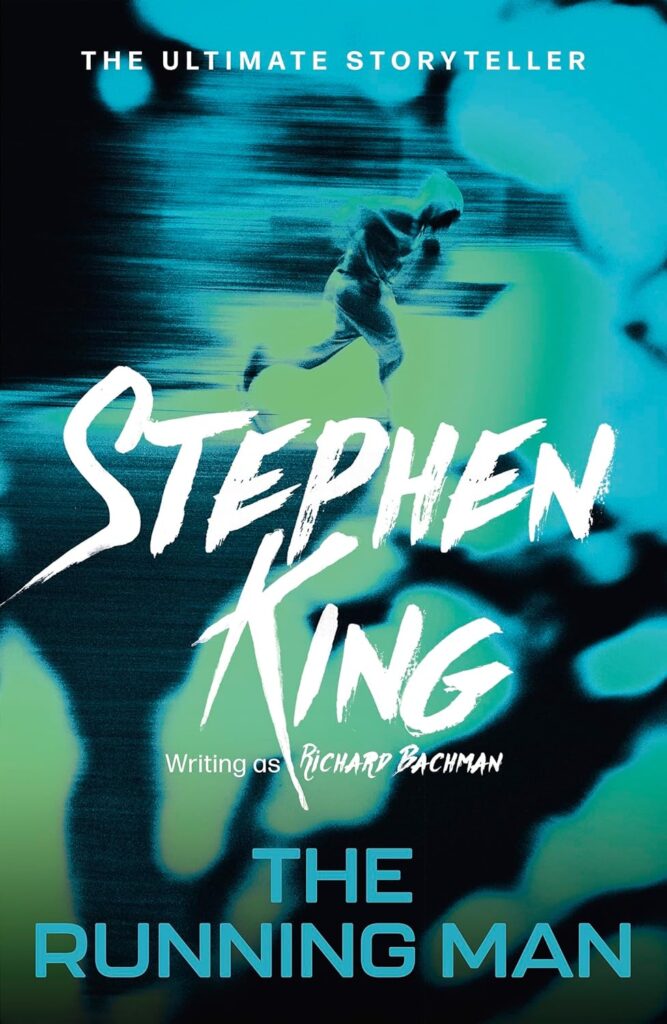
• The Running Man by Stephen King, writing as Richard Bachman (AmazonUK Affiliate Link)
It’s not just a game when you’re running for your life.
Every night they tune in to the nation’s favourite prime-time TV game show.
They all watch, from the sprawling slums to the security-obsessed enclaves of the rich. They all watch the ultimate live death game as the contestants try to beat not the clock, but annihilation at the hands of the Hunters. Survive thirty days and win the billion dollar jackpot – that is the promise. But the odds are brutal and the game rigged. Best score so far is eight days.
And now there is a new contestant, the latest Running Man, staking his life while a nation watches…
The Running Man is also one of the three stories featured in The Bachman Books.
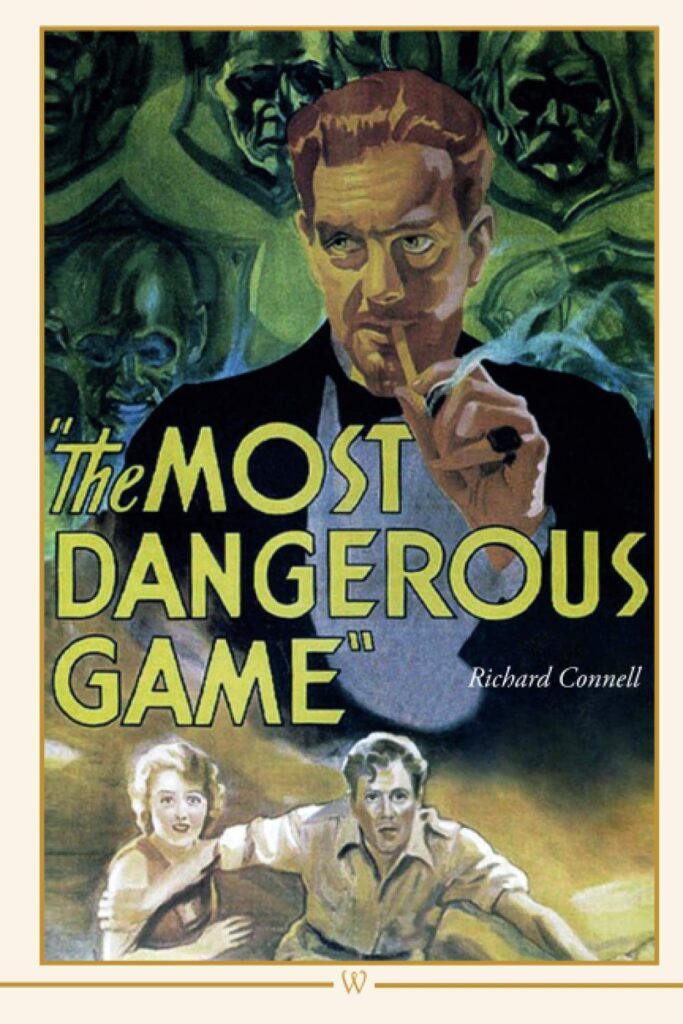
• The Most Dangerous Game by Richard Connell (AmazonUK Affiliate Link)
“The Most Dangerous Game”, also published as “The Hounds of Zaroff”, is a story by Richard Connell, first published in Collier’s on 19th January 1924. The story features a big-game hunter from New York City who falls off a yacht and swims to what seems to be an abandoned and isolated island in the Caribbean, where he is hunted by a Russian aristocrat. The story is inspired by the big-game hunting safaris in Africa and South America that were particularly fashionable among wealthy Americans in the 1920s.
The story has been adapted numerous times, most notably as the eponymous 1932 RKO Pictures film, starring Joel McCrea and Leslie Banks, and for a 1943 episode of the CBS Radio series Suspense, starring Orson Welles. It has been called the “most popular short story ever written in English.” Upon its publication, it won the O. Henry Award.
Categories: Features, Film, Other Worlds, Reviews
 In Review: 28 Years later: The Bone Temple
In Review: 28 Years later: The Bone Temple  In Review: Peter Hujar’s Day
In Review: Peter Hujar’s Day  In Review: Marty Supreme
In Review: Marty Supreme  In Review: Avatar – Fire and Ash
In Review: Avatar – Fire and Ash
I agree with this review – the film had its moments but I’ve come to expect more creativity and originality from Edgar Wright. To take an analogy from teaching, it was like when an able pupil hands in merely acceptable work and you wonder whether they were being lazy or if something is going on behind the scenes and distracting them. Lots of missed opportunities to tighten the editing, polish the dialogue with a little more wit or make a supporting character more engaging and the film as a whole more memorable.